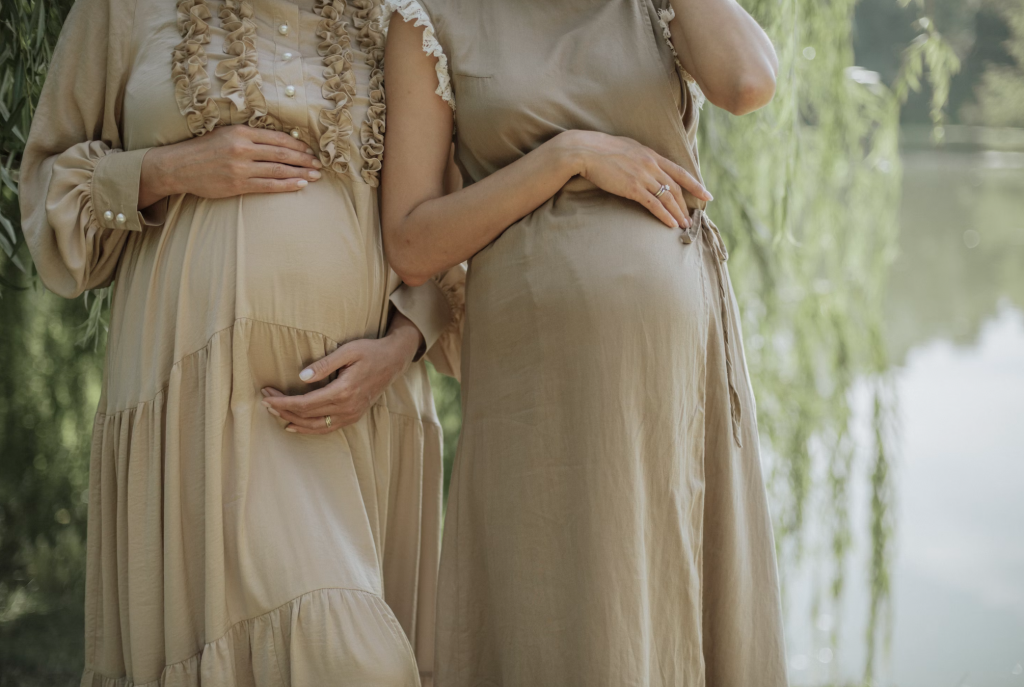This Simbang Gabi homily (Luke 1:39-45) was delivered at the Church of the Gesu (Ateneo de Manila University) last 21 December 2023.
We’ve all heard the Visitation story before: Mary learns of her cousin Elizabeth’s pregnancy from the angel Gabriel, and she decides to make the trip to Judah not only to confirm the angel’s news, but also to help her elderly cousin out in what is surely expected to be a difficult pregnancy.

It doesn’t seem to be such a significant event, this V, a sort of minor Joyful Mystery squeezed between two of the biggies: the earthshaking mysteries of the Annunciation and the Nativity. But the Church in her wisdom tells us: Today, even with just a few days left before Christmas Day, do not rush to Bethlehem—at least, not just yet. Instead make this detour to Judah with Mary.
Why? Probably because there’s a grace waiting to be unwrapped there.
For me that grace is found in Elizabeth’s question to Mary. The moment she lays eyes on her, Elizabeth cries out: “How does this happen to me, that the mother of my Lord should come to me?”
It is a question that bursts out of her because as she herself explains, as soon as she hears Mary’s greeting, the infant in her womb—the future John the Baptist—leaps with joy.
Elizabeth’s question is a question of amazement and awe. Elizabeth and the child in her womb are seized by the unbelievable fact that someone like Mary—she who bears the Lord in her very womb—would actually show up at their doorstep and visit them. “How does this happen to me?” is Elizabeth’s way of saying, “I can’t believe this is happening to me! It is simply impossible. It is simply too good to be true!”
When we think about it, this question applies not only to this visitation by Mary, but also to two prior—immeasurably more unbelievable and more impossible—visitations by God.
Remember, the Visitation is the meeting of two women with very unexpected pregnancies. On the one hand, we have Elizabeth—unexpectedly with child—long after she has stopped wishing, praying, or hoping for one. After years of waiting, of holding her breath, and of enduring the derision of others, having been dismissed cruelly all her life as “the barren one,” she bears this child in her old age, a blessing that God finally gives long after Elizabeth and Zechariah have given up. It has been such a surprise that Zechariah literally becomes speechless when he first hears the news from the angel Gabriel.
Elizabeth and Zechariah must have cried out too: “How does this happen to us that the Lord has visited us now?” Unbelievable and impossible news like that is simply too good to be true.
And then we have Mary, also suddenly with child, perhaps even before she has even wished for one. The question she asks the angel at the Annunciation is strikingly similar to Elizabeth’s: “How can this be since I have no relations with a man?” It is a question no less punctuated by amazement and awe. “How can this be? How does this happen that the Lord has visited me and His people with a gift beyond imagination?”
The Visitation is a reminder that ours is a God of unimaginable surprises, the God Who is the giver of gifts too good to be true—or as the late Filipino Jesuit Horacio dela Costa has written: “Too good to be false!” Today’s Gospel invites us to give ourselves permission to be amazed and awed once again at the unbelievable and unimaginable act of God: That out of His great love for us, God the ever-Transcendent One actually transcends His transcendence to be here, dwelling among us. By letting His Divine Son pry Himself from the heavens to take flesh, God becomes Emmanuel—with us and one of us.
What can be more unbelievable and unimaginable than that?
And so I know we’ve heard all these stories countless times before, but can we—just this evening, just this Christmas—join Mary and Elizabeth in asking with amazement and with awe: “How can this be? How can this happen to us?” How can God show up at our doorstep and visit us?
I suspect the Lord knows we need such a reminder. God knows I do!
Just when we thought the nightmare of the pandemic was over, Ukraine happened, followed by Gaza. So many lives and so many loved ones lost in the pandemic and all these unnecessary killings. But also, when we look at our own lives, so many hopes broken and dreams dashed for ourselves, for the world, for our own people.
I don’t know about you but these days, to remain hopeful—that feels like defying gravity. If we stopped exerting effort, we would quickly fall into despair.
For with all that’s going on and all that’s going wrong, nothing feels more unbelievable or more impossible than God being with us and promising us a better future, a better world, or a better Philippines. It will take one hell of an effort to set aside our skepticism and our jadedness, and to choose to be hopeful again.
Bu dear friends, choose we must.
Christmas after all is the season for believing the unbelievable and imagining the impossible. Appearances to the contrary notwithstanding, all shall be well! Remember the angel Gabriel’s words of reassurance to Mary right before he leaves her: “Nothing is impossible with God.” And remember the Elizabeth’s declaration to Mary at the Visitation, “Blessed are you for you have believed.”
This Christmas, let us give ourselves permission to once again believe what has become unbelievable and to imagine what, more than ever, feels impossible. Let us allow ourselves to be re-enchanted with this broken world—precisely the same broken world that God has chosen to be such a part of. Let us choose to believe that despite all our weaknesses and all our wickedness, the world is always and ever made fresh by the Word made flesh.